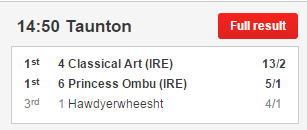Dead Heat Rules
Simply put, a dead heat is when two or more selections tie for a given position. Dead heat is a term that you're likely to come across a few times with our products, particularly if you're betting on events like horse racing or golf. In this article, we'll run you through our dead heat rules, and how these can impact your betting experience.
General
There are several scenarios in which a dead heat could be called. For example, in Horse Racing, a dead heat could occur if both horses cross the finish line together and the judge cannot separate them. In other events, such as Golf, players might have finished with the same score and are therefore classified in a joint position (i.e. a second place tie).
In a dead heat for first place, the stake on a winning selection is divided by the number of winners in the dead heat. The full odds are then paid to the divided stake, with the remainder of the money being lost. For example:

In this example, £10 on Classical Art (13/2) with the stakes halved would return £37.50 and £10 on Princess Ombu (5/1) with the stakes halved would return £30.
Place Bets
A similar rule to that above applies to the place part of a bet where, as a result of a dead heat, more than the required number of selections are placed. Here's an example of how this could play out:
- You place a £10 each-way bet on a horse at 16/1 in a race that is paying 1/4 of the odds for the first three places.
- Your selection places joint third in a dead heat with another horse.
- Your bet would then be processed as: £10 / 2 = £5 x (1/4) of 16/1 = £5 x 4/1 = £25 (and the win part of the bet loses as the horse finished joint third).
Golf
Dead heats in golf are common because players often card the same score and end up finishing in the same position. Generally, there won't be a dead heat for 1st place. If 2 players tie for the lead, they'll enter a play-off. The winner of the play-off will be declared the winner of the tournament, with the loser being placed 2nd.
For example, with the 2015 US Masters, the result was:
1: Jordan Spieth
T2: Justin Rose
T2: Phil Mickelson
4: Rory McIlroy
5: Hideki Matsuyama
T6: Paul Casey
T6: Ian Poulter
T6: Dustin Johnson
With different place terms being available at different stages of play, some players may end up being paid in dead heats for some bets and not others. For instance, if you placed a bet on Justin Rose on the last day and the place terms were 1/3 1-2, your place part of the bet will be subject to a half stake dead heat. However, if you placed a bet on Justin Rose earlier in the tournament and the each-way terms were 1/4 1-2-3, there is no dead heat.
We offer a variety of each way betting on golf tournaments, including each way odds for 1/4 odds for the first 6 places. In the above example of the 2015 US Masters, there are three players tied for 6th place. Therefore, here, the stake is divided by the number of players tied for this position. For example, if you had £30 EW on Ian Poulter at 20/1 at each way terms of 1/4 1-2-3-4-5-6 your bet would be settled as follows:
- £30 win on Ian Poulter = Loss
- £30 place on Ian Poulter = three way dead heat for sixth place = stake divided by three: £30 / 3 = £10 at place odds (1/4 of 20/1) = 20/4 = 5/1. So, £10 at 5/1 returns £60.
Multi-player Dead Heats
Things can get a bit trickier if there are more players dead heating for different positions. See the example below of the 2020 PGA Championship:
1: Collin Morikawa
T2: Paul Casey
T2: Dustin Johnson
T4: Jason Day
T4: Bryson DeChambeau
T4: Tony Finau
T4: Scottie Scheffler
T4: Matthew Wolff
If you've backed any of the five players in joint fourth place at odds of 1/4 1-2-3-4, the returns are calculated as demonstrated in the previous section. However, if the place terms were 1/4 1-2-3-4-5 then the settlement would be different...
There are five players dead heating for two positions (4th and 5th) and so you'd be paid at 2/5th of stake. If you had £10 E/W on Scottie Scheffler at 40/1, your bet would be settled as follows:
- £10 win on Scottie Scheffler = Loser
- £10 place on Scottie Scheffler = Five players tied for two positions = 2/5 of the stake
- 2/5 of £10 = £4 at place odds (1/4 of 40/1) = 10/1
- So, £4 at 10/4 returns £44
For other similar situations, you'd need to work out the number of positions tied for, divided by the number of players tied in that position.